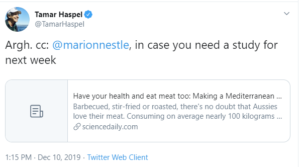Industry-funded study of the week: adding pork to a Mediterranean diet
I saw this tweet from Washington Post columnist Tamar Haspel:

I took the bait.
Science Daily summarized the study.
Incorporating 2-3 serves (250g) of fresh lean pork each week, the Mediterranean-Pork (Med-Pork) diet delivers cognitive benefits, while also catering to Western tastes, and ensuring much lower greenhouse-gas emissions than beef production.
Since the article gave the name of the lead author, Alexandra Wade, and the name of the study, MedPork, I had no trouble finding the actual study.
The study: A Mediterranean Diet with Fresh, Lean Pork Improves Processing Speed and Mood: Cognitive Findings from the MedPork Randomised Controlled Trial. Wade A, et al. Nutrients 2019, 11, 1521; doi:10.3390/nu11071521.
Conclusion: “Compared to LF [low-fat diet], the MedPork intervention led to higher processing speed performance (p = 0.01) and emotional role functioning (p = 0.03).”
Funding: “This study was funded by the Pork Cooperative Research Centre (#3B-113). The Pork CRC had no role in the study design, implementation, analysis or interpretation of data. Acknowledgments…We would also like to acknowledge the following organisations for their generous contributions: Almond Board of Australia for the donation of almonds; Cobram Estate for the donation of Australian extra virgin olive oil; and Simplot Australia Pty Ltd. for the donation of legumes, tuna and salmon.”
Comment: This study was so obviously industry-funded that Haspel could tell without even looking at it (the Science Daily article did not mention the funder—it should have). What these investigators did was to add a bit more than half a pound of pork a week to an otherwise healthful diet; They found that people like this diet better than one that is low-fat. Why would anyone do a study like this? I can think of only one reason: to give pork a health aura so you will eat more of it, obviously.
Addition
A reader points out that this is not Wade et al’s only sponsored study. Here are some others:
- A Mediterranean Diet with Fresh, Lean Pork Improves Processing Speed and Mood: Cognitive Findings from the MedPork Randomised Controlled Trial. Wade AT, Davis CR, Dyer KA, Hodgson JM, Woodman RJ, Keage HAD, Murphy KJ. Nutrients. 2019 Jul 4;11(7). pii: E1521. doi: 10.3390/nu11071521. Sponsor: Pork Cooperative Research Centre
- A Mediterranean Diet to Improve Cardiovascular and Cognitive Health: Protocol for a Randomised Controlled Intervention Study. Wade AT, Davis CR, Dyer KA, Hodgson JM, Woodman RJ, Keage HA, Murphy KJ. Nutrients. 2017 Feb 16;9(2). pii: E145. doi: 10.3390/nu9020145. Sponsor: Dairy Australia.
- Including pork in the Mediterranean diet for an Australian population: Protocol for a randomised controlled trial assessing cardiovascular risk and cognitive function. Wade AT, Davis CR, Dyer KA, Hodgson JM, Woodman RJ, Keage HAD, Murphy KJ. Nutr J. 2017 Dec 22;16(1):84. doi: 10.1186/s12937-017-0306-x. Sponsor: Pork Cooperative Research Council
- A Mediterranean diet supplemented with dairy foods improves markers of cardiovascular risk: results from the MedDairy randomized controlled trial. Wade AT, Davis CR, Dyer KA, Hodgson JM, Woodman RJ, Murphy KJ. Am J Clin Nutr. 2018 Dec 1;108(6):1166-1182. doi: 10.1093/ajcn/nqy207. Sponsor: Dairy Australia Effects of Mediterranean diet supplemented with lean pork on blood pressure and markers of cardiovascular risk: findings from the MedPork trial. Wade AT, Davis CR, Dyer KA, Hodgson JM, Woodman RJ, Murphy KJ. Br J Nutr. 2019 Oct 28;122(8):873-883. doi: 10.1017/S0007114519001168. Epub 2019 Sep 23. Sponsor: Pork Cooperative
Research Centre.

